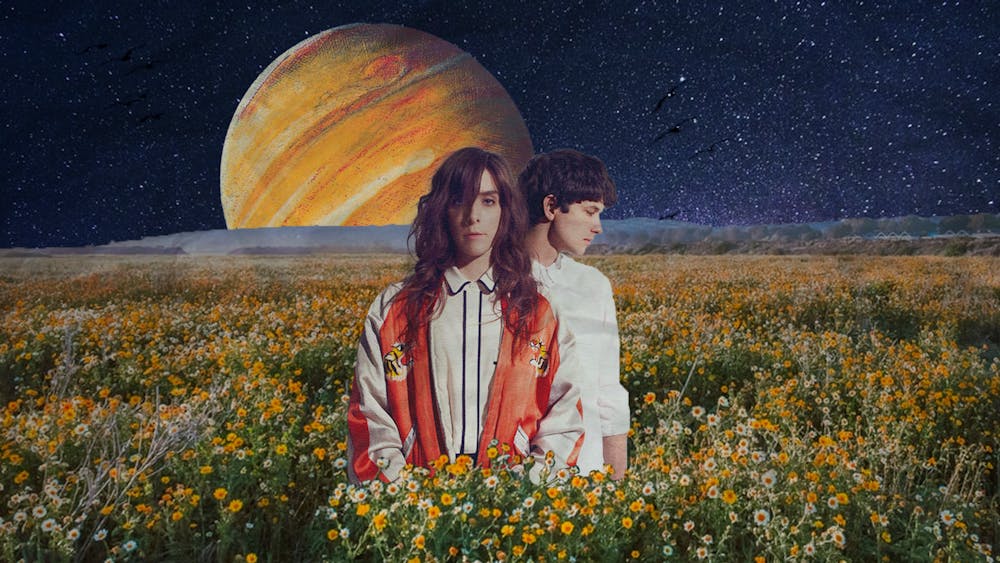Since their 2006 self–titled debut, Baltimore duo Beach House has gained significant influence as an indie band, while always relying on the same mesmerizing vocals, synths, and distorted acoustics to create their distinct dream–pop sound. Given that, plus the fact that “nobody has any attention span” according to band member Alex Scally, Beach House worried an 18–song album released in four chapters would be far too much. But on their new sprawling and abundant record Once Twice Melody, every song has its place. The double LP is a blend of all of the band’s previous work, combining the drama of Teen Dream and Bloom, the dark edge of Depression Cherry, and the heaviness of 7. The album welcomes the listener into another world that transcends time and etherealizes the mundane. The 84–minute journey into the cosmos acts as a protest against rushing through life in a linear fashion by creating an introspective and surprisingly intimate experience.
The opening track, also titled “Once Twice Melody,” introduces the theme of how we perceive the passing of time. Accompanied by dreamy vocals, soft guitar, and chord changes that are emblematic of Beach House’s sound, vocalist Victoria Legrand sings in the chorus, “Days go by / In her eyes / Once, twice, melody.” These lyrics suggest that we have the power to change the way we view and respond to the events of our lives, whether dramatic or routine. In the album’s universe, time passing is like a melody, not something provoking stress, boredom, or sadness. Like time itself, all elements of the album come together to make something synergistic and beautiful even if, in the heat of the moment, things seem misaligned or unimportant.
From the following chapter, “New Romance" builds on these ideas and conveys a sense of growth as the journey of the album progresses. Legrand opens the song with the same “days go by” lyric as in the chorus of “Once Twice Melody,” creating a sense of continuity from the album's first chapter. But this time around, it’s from a different perspective. On “New Romance,” Legrand sings, “You’re somebody else, somebody new / ’Fuck it,’ you said, ‘it’s beginning to look like the end.’” Instead of powerlessly succumbing to passing days, this "you" experiences growth, is open to change, and recognizes when it’s time to move on. However, growth and progress are not linear, and it's easy to get swept up in setbacks. “Runaway,” set to a futuristic, consuming backbeat, reminds us of this. Legrand asks the listener, “Can you cover what you’re hiding from?” The song suggests that no one can suppress their inner pain completely. “Runaway” encourages us to run towards those we love with honesty rather than run away from the pain and trauma we face ourselves.
On the other hand, “Hurts to Love,” notably released as a standalone track on Valentine’s Day, concedes that there's a lot of discomfort inherent to being open to love as your true self. However, it's also adamant that “if it hurts to love / You better do it anyway / If it hurts too much / Well, I loved you anyway.” Even when two people have hurt one another, Legrand reminds us that at one point there was love between them. Rather than representing the pain and anger of the moment, the planet of Once Twice Melody is a world where the listener can feel the longing, infatuation, and regret of a relationship all at once.
With song titles like “Over and Over,” “Another Go Around,” and “Many Nights,” time and its cyclical nature are clear focal points of Once Twice Melody. Yet, the so–called “Finale” is the album's fifth–to–last track. The song asks, “Is it over? / Yeah, it’s over.” What can feel like another step in an endless routine may come to a close. Sometimes, that means a part of life—a relationship, job, or state of mind—has run its course. But other times, the song suggests, “The best time of all / I was not looking for it,” hinting at the exquisite elements of our everyday lives that only begin to stand out to us once they have ended. Even though, it's impossible to constantly exist in the state of Once Twice Melody, appreciating all that space and time have to offer, “Finale” asks us to remain grounded in the present so we can look back on a satisfying life.
As the album’s actual concluding track “Modern Love Stories” says, “The end is the beginning / Beginning to an ending.” Despite not being a physical place, the album acts as a space for the listener to reflect on their experiences. It's a distinct and all–consuming creation that provides clarity, free from the obfuscation of time and the distractions of a busy day. Once Twice Melody challenges the notions of a conventional album, one that has more variation and songs with distinct choruses intended for singing along. It's more akin to the feeling of falling asleep on the couch and waking up in your bed, or driving home on autopilot and wondering how you made it to the door. Listening to it in its entirety from start to finish is an immersive, emotional experience that grabs your attention and then draws you into a hypnotic journey. With Once Twice Melody, Beach House do what only they can, and invent a universe in the space of 18 songs.

